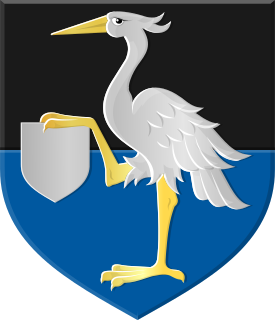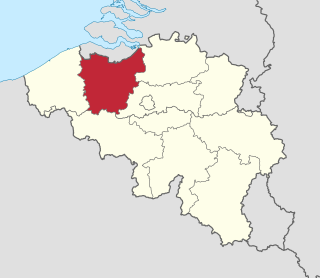
Flanders is the Dutch-speaking northern portion of Belgium and one of the communities, regions and language areas of Belgium. However, there are several overlapping definitions, including ones related to culture, language, politics, and history, and sometimes involving neighbouring countries. The demonym associated with Flanders is Fleming, while the corresponding adjective is Flemish. The official capital of Flanders is the City of Brussels, although the Brussels-Capital Region has an independent regional government. The government of Flanders only oversees the community aspects of Flanders life in Brussels, such as Flemish culture and education.

Flemish Brabant is a province of Flanders, one of the three regions of Belgium. It borders on the Belgian provinces of Antwerp, Limburg, Liège, Walloon Brabant, Hainaut and East Flanders. Flemish Brabant also surrounds the Brussels-Capital Region. Its capital is Leuven. It has an area of 2,118 km2 (818 sq mi) which is divided into two administrative districts containing 65 municipalities. As of January 2019, Flemish Brabant has a population of 1,146,175.

Belgium is a federal state comprising three communities and three regions that are based on four language areas. For each of these subdivision types, the subdivisions together make up the entire country; in other words, the types overlap.

The country of Belgium is divided into three regions. Two of these regions, Flanders and Wallonia, are each subdivided into five provinces. The third region, Brussels, is not divided into provinces, as it was originally only a small part of a province itself.

The Flemish Parliament constitutes the legislative power in Flanders for matters which fall within the competence of Flanders, both as a geographic region and as a cultural community of Belgium.

The Parliament of Wallonia is the legislative body of Wallonia, one of the three self-governing regions of Belgium. The parliament building, the former Hospice Saint-Gilles, is situated in Namur, the capital of Wallonia, at the symbolic confluence of the Meuse and the Sambre, the two main rivers of the most inhabited parts of Wallonia, the Sillon industriel. On the other side of the Meuse, facing the Parliament, is the Élysette, the seat of the Government of Wallonia.

The Vlaamse Gemeenschapscommissie is the local representative of the Flemish authorities in the Brussels-Capital Region, one of the three regions of Belgium. The VGC depends on the Flemish Parliament, and its council is made up by the members of the Dutch linguistic group of the Brussels Parliament, whereas its executive is made up of the two Flemish ministers and the Flemish secretary of the Brussels-Capital Government.

The Belgian Federal Parliament is the bicameral parliament of Belgium. It consists of the Chamber of Representatives and the Senate. It sits in the Palace of the Nation. The Chamber of Representatives is the primary legislative body; the Senate functions only as a meeting place of the federal communities and regions.

The area within Belgium known as Brussels-Halle-Vilvoorde encompasses the bilingual—French and Dutch—Brussels-Capital Region, which coincides with the arrondissement of Brussels-Capital and the surrounding Dutch-speaking area of Halle-Vilvoorde, which in turn coincides with the arrondissement of Halle-Vilvoorde. Halle-Vilvoorde contains several municipalities with language facilities, i.e. municipalities where French-speaking people form a considerable part of the population and therefore have special language rights. This area forms the judicial arrondissement of Brussels, which is the location of a tribunal of first instance, enterprise tribunal and a labour tribunal. It was reformed in July 2012, as part of the sixth Belgian state reform.
Flemish Sign Language is a deaf sign language of Belgium. It is closely related to French Belgian Sign Language, but they are now generally recognized as distinct languages. VGT is estimated to include around 6,000 sign-language users.

The Flemish Heraldic Council advises the Flemish Government on all matters relating to heraldry. The Council was created on 11 April 1984, as the successor to the Subcommittee for Heraldry or Subcommissie Heraldiek, established in 1978. Its prime task was to supervise the granting of a coat of arms and a flag to all municipalities of the Flemish Region. Following the reorganization of the Belgian provinces, the council's field of action was extended to provincial arms and flags in 1994. Since 2000, the Council has likewise advised the Flemish Government on grants of arms to Flemish individuals and corporations. In the meantime, more than 200 of such grants have received official sanction. Grants of arms by the Flemish Government are published in the Belgian official journal.

The Union of Francophones is a political party in Belgium that participates as electoral lists in regional, provincial, and municipal elections in the Flemish Province of Flemish Brabant. As its name suggests, its primary target is the French-speaking community of Flemish Brabant and particularly those who live in the officially Dutch-speaking area Halle-Vilvoorde including the now predominantly French-speaking municipalities with language facilities in the Brussels Periphery. Its main goal is to provide both constitutional exemptions for and privileges to Francophones living in Dutch-speaking Flanders, for example by annexing the municipalities with language facilities to the officially bilingual Brussels-Capital Region.
Regional elections were held in Belgium on 7 June 2009 to choose representatives in the regional parliaments of Flanders, Wallonia, Brussels and the German-speaking Community of Belgium. These elections were held on the same day as the European elections.
Federal elections were held in Belgium on 25 May 2014. All 150 members of the Chamber of Representatives were elected, whereas the Senate was no longer directly elected following the 2011–2012 state reform. These were the first elections held under King Philippe's reign.

Federal elections were held in Belgium on 26 May 2019, alongside the country's European and regional elections. All 150 members of the Chamber of Representatives were elected from eleven multi-member constituencies.

The 2019 Belgian regional elections took place on Sunday 26 May, the same day as the 2019 European Parliament election as well as the Belgian federal election.

Limburg is a parliamentary constituency in Belgium used to elect members of the Flemish Parliament since 2004. It corresponds to the province of Limburg.

Antwerp is a parliamentary constituency in Belgium used to elect members of the Flemish Parliament since 2004. It corresponds to the province of Antwerp.

East Flanders is a parliamentary constituency in Belgium used to elect members of the Flemish Parliament since 2004. It corresponds to the province of East Flanders.

West Flanders is a parliamentary constituency in Belgium used to elect members of the Flemish Parliament since 2004. It corresponds to the province of West Flanders.

















